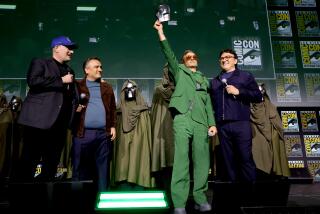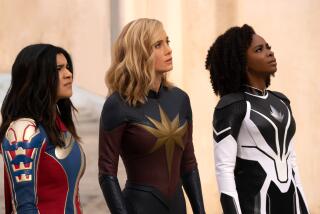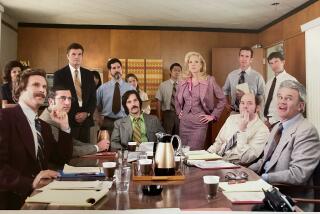Living Well Is the Best ‘Avengers’
- Share via
That sorry monotone of a movie, “The Avengers,” is giving a rotten name to the supremely sly and mirthful British TV series from which it came.
The movie is a bad seed, with Ralph Fiennes and Uma Thurman battling Sean Connery’s deranged, weather-freaked super heavy in a humorless snooze. When Connery tells a victim in his control, “You’ll awaken, you’ll remember nothing,” he perfectly summarizes what it’s like being in the audience.
And from such good stock, too.
As a series, “The Avengers” was Anglophilic through and through. The drolly written incarnation that ran on ABC in the late ‘60s co-starred Patrick Macnee with Diana Rigg, and later with Linda Thorson, as a pair of British counter-espionage agents who foiled one amusingly bizarre and diabolical villain after another.
Macnee also co-starred in “The New Avengers,” a remake that ran on CBS in the late ‘70s but failed to rekindle that earlier flame.
The earlier series shown on ABC was not to be believed but not to be missed, with episodes ranging from (these are two of my favorites) a nightmarishly mind-bending Dickens sendup to a near-lethal encounter with the Guild of Noble Nannies (GONN). What could be more insidious than bouncing rubber balls that reduce grown men to goo-gooing babes thinking they are back in the nursery?
What grand fun, what magnificent, sophisticated nonsense. That old CBS hour “The Wild, Wild West” is the only U.S. adventure series even to approach--but not very near--the witty, self-mocking fantasy of “The Avengers.”
Macnee was the relentlessly debonair, bowlered, boutonniered, umbrella-bopping Steed, a very proper and genial gent but hardly someone to be taken lightly. And Rigg, who easily delivered the highest wattage of his partners in her auburn flip and stretch jumpsuits, was the delectable but formidable Emma Peel, maestro of the karate chop and body slam.
Something may have been going on between Steed and Emma, who exchanged the kind of flirty smiles and glances that implied shared secrets that viewers could only speculate about. With few exceptions, they were also whimsically unflappable even when in peril, projecting a smirky charm and matchless chemistry that happily are on display again in A&E; Video’s just-released two three-volume sets of digitally restored episodes from the 1967 season.
These new videos are terrific. Prepare for a good time.
What you get is the lighthearted “Englishness in exaggerated form” that Macnee described in London’s the Daily Telegraph recently: “Ours was an England of country houses and butlers, of homely country pubs and absurdly pretty villages, of aristocrats who were chimney sweeps, of milkmen who were masterminds, of incompetent Russian agents who . . . in the midst of the Cold War, yearned with all their hearts to have just a fraction of Steed’s style. [An] England that never existed and never will exist, and yet an England we all dream could somehow be.”
It’s also a spot, Macnee wrote, “where even the most ghastly of masterminds would understand that everything must stop for tea.”
As in “The Correct Way to Kill,” whose hilarious tweaking of Quaint Old England is quintessential Steed and Emma. I popped in the cassette and was immediately transported.
It seems that Soviet agents are being bumped off in London, and the Soviets think Steed is behind it. So there in Steed’s doorway stands a Soviet operative of the bumbling type, on a mission.
Steed: “Hello.” Soviet: “Goodbye.”
Before the revolver-wielding intruder can fire away, though, he’s bashed by Emma, tumbling into a chair beside Steed, who hands him a glass of red wine and says with his customary smile and good manners: “Now that you’re here, why don’t you stay for a drink?”
It sings.
Actually, Steed is horrified that his Soviet counterparts are being plugged (“It’s not ethical. It’s just not cricket”), and that Ivan, “second in command of counter-counter-espionage,” would want to kill him over this. “I thought we were the best of enemies.”
The real enemy turns out to be SNOB, a finishing school for stiff-upper-lipping, impeccably tailored young gentlemen learning the genteel art of assassination. Steed infiltrates the group, mightily impressing the starchy headmaster with his carriage: “The way you doffed your bowler, the pure economy of movement, the elegance of stance. . . . “ It does take the breath away.
Naturally, Steed and Emma ultimately snuff SNOB, but not before the tradition-worshiping assassins tie up a Soviet operative, leading to one of the most memorable lines of the millennium: “It will do you no use to struggle. We’ve secured you with old school ties.”
*
Somewhere near the beginning of each episode, Steed would deliver a message to Emma telling her, “Mrs. Peel--we’re needed.” Now more than ever.
“The Avengers” presents an age when stereotypes were stereotypes and no one thought twice about Steed and Emma preferring wine and champagne breaks to tea and biscuits. Because in many ways it was ahead of its time, however, and its style and creativity remain captivating, the series is not at all dated and is just as much fun to watch now as three decades ago.
The movie misses this tone and flair entirely. On the phone from Palm Springs, where he now resides with his wife, Baba, Macnee weighed in recently on the big screen version of “The Avengers,” in which he has a tiny voice-over role, saying he didn’t care for a lot of what he saw.
“Where was the charm, the lightness, the wit and the genuine humor?” he wondered. Where, indeed?
Macnee, who just came out with an illustrated companion book to the series, “The Avengers and Me” (TV Books), also faulted the movie for having “no big comic villains” and “no genuine sexual perversity.” And for making Thurman’s Emma dominant over Fiennes’ Steed, who he said resembles a “humble bank clerk and plays the part in a muted whisper.” He said all of Fiennes’ good scenes were dropped from the original script that he read, and that “Fiennes has to be furious.”
Macnee tempered his criticism, however, by saying that, on another level, he enjoyed the movie and found it to be “an exciting American action film.” Proving that he is as much a gentleman as Steed.
More to Read
The complete guide to home viewing
Get Screen Gab for everything about the TV shows and streaming movies everyone’s talking about.
You may occasionally receive promotional content from the Los Angeles Times.






